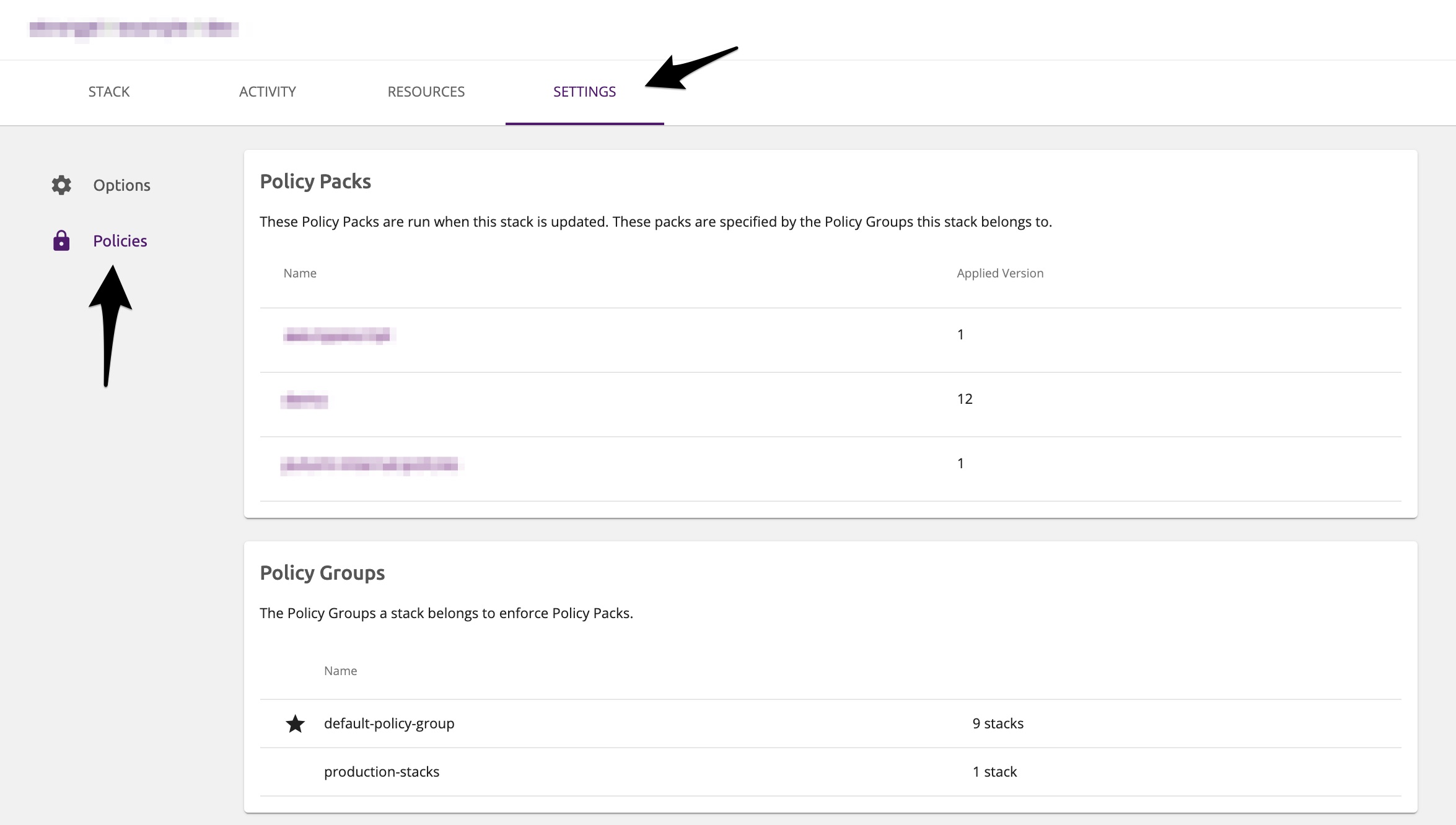Policy as code FAQ
Is CrossGuard open source?
The Pulumi Policy SDK that allows you to express policies and using the local --policy-pack flag (as part of the Pulumi CLI) to enforce Policy Packs is also open source.
Pulumi CrossGuard is available to Pulumi Business Critical organizations and allows for enforcing Policy Packs across an organization and viewing Policy Pack results in the Pulumi Cloud.
How do Policy Packs enforced by the service interact with Policy Packs specified by the local Policy Pack flag?
Policy Packs enforced by the Pulumi Cloud are always run by the Pulumi CLI.
Therefore, if a Policy Pack is specified locally using --policy-pack, the Pulumi CLI will run the local Policy Pack as well as the Policy Packs enforced by the Pulumi Cloud. A violation by any of the Policy Packs would halt an update.
What happens if a stack belongs to multiple Policy Groups?
If a stack belongs to multiple Policy Groups, the Pulumi Cloud will aggregate all required Policy Packs from those Policy Groups. Only one of version of each Policy Pack will be run per update.
This means that if a stack belongs to multiple Policy Groups that specify different versions of a Policy Pack, only the newest version of that pack will be run. For example, if a stack my-stack belongs to Policy Group production-stacks that requires Policy Pack aws-policies version 2 and Policy Group platform-stacks that requires Policy Pack aws-policies version 4, only version 4 of aws-policies would be run. In the case that a stack has the same version of a Policy Pack with different configuration enabled, the most recently modified Policy Pack and configuration will be enforced.
Under a stack’s “Settings” tab you can take a look at the Policy Packs that would be enforced on a preview or update as well as the Policy Groups that the stack belongs to.

How does Policy as Code work during a stack import or refresh?
During pulumi stack import, Policy Packs are not run. This command does not modify any resources and allows you to make manual changes to the state file. During the next update, the resources and state file would be updated based on the stack’s Pulumi program, which must be in compliance to succeed.
During pulumi refresh, no resources are modified. This command updates the state file with the current state of the resources. If there are out-of-compliance resources that get consumed into the state file during the pulumi refresh command, they will be updated during the next update to reflect the declared infrastructure from the stack’s Pulumi program. The Pulumi program must be in compliance with the required Policy Packs for the update to be successful.
What happens if I add a Policy Pack that causes an existing resource to become out-of-compliance?
The next preview or update of the stack with fail due to the policy violation. The stack will need to be fixed before it can be updated.
A stack with out-of-compliance resources can be destroyed.
How do I version a Policy Pack?
Policy Packs that are published to the service require a version. The Policy Pack version is specified in the package.json file for TypeScript/JavaScript (Node.js) packs. The example below shows a Policy Pack version specified as 0.1.0.
{
...
"version": "0.1.0",
...
}
For Python Policy Packs, the version is specified in the PulumiPolicy.yaml file.
version: 0.1.0
A version can only be used one time and once published the version can never be used by that Policy Pack again.
How are secrets handled in policies?
Encrypted secrets are decrypted during previews and updates. Any policy that is run against a stack can access the values in plaintext. It is up to you to treat these values sensitively and only run policies that you trust.
How are dependencies managed with Python Policy Packs?
As of Pulumi 2.4.0, new Python Policy Packs created with pulumi policy new will have a virtual environment created in a venv directory with required dependencies from requirements.txt installed in it, and Pulumi will automatically use this virtual environment when running the program.
This behavior is controlled by the following virtualenv runtime option in PulumiPolicy.yaml:
runtime:
name: python
options:
virtualenv: venv
virtualenv is the path to a virtual environment to use.
Existing Python Policy Packs can opt-in to using the built-in virtual environment support by setting the virtualenv option. To manually create a virtual environment and install dependencies, run the following commands in your Policy Pack directory:
python3 -m venv venv
venv/bin/pip install -r requirements.txt
python3 -m venv venv
venv/bin/pip install -r requirements.txt
> python -m venv venv
> venv\Scripts\pip install -r requirements.txt
If you prefer to manage the virtual environment on your own (for example, using tools like Pipenv), you can delete the local venv directory and unset the virtualenv option in PulumiPolicy.yaml:
runtime: python
When managing the virtual environment on your own and running the Policy Pack locally against a Pulumi program, you’ll need to run any pulumi commands (such as pulumi up) from an activated virtual environment shell (or, if using a tool like Pipenv, prefix any pulumi commands with pipenv run pulumi ...). If the Pulumi program is also Python, both the Policy Pack and Pulumi program can use the same virtual environment.
Enforced Policy Packs that are published to the Pulumi Cloud will automatically create a virtual environment, install dependencies in the virtual environment, and use the virtual environment when running against a Pulumi stack.
Adding a new dependency
To install a new dependency in the virtual environment, add an entry to requirements.txt, and run the following in your Policy Pack directory:
venv/bin/pip install -r requirements.txt
venv/bin/pip install -r requirements.txt
> python -m venv venv
> venv\Scripts\pip install -r requirements.txt
More FAQ
Thank you for your feedback!
If you have a question about how to use Pulumi, reach out in Community Slack.
Open an issue on GitHub to report a problem or suggest an improvement.
